Class 10 Exam > Class 10 Notes > History for GCSE/IGCSE > The Difficulties of Ruling Russia up to 1914
The Difficulties of Ruling Russia up to 1914 | History for GCSE/IGCSE - Class 10 PDF Download
What Nicholas II Was Like as a Tsar? - Overview
- Nicholas II became Tsar of Russia in 1894, following the death of his father, Alexander III. Alexander III was a towering figure at 6 foot 4 inches, known for his patriotism and ruling Russia through violence and fear. Nicholas II, in contrast, never gained his father’s approval. When his father fell ill, Nicholas feared succeeding him and remarked, "I am not prepared to be a tsar. I never wanted to become one. I know nothing of the business of ruling." This statement effectively summarizes Nicholas II’s reign.
- Nicholas attempted to emulate his father’s autocratic style but lacked Alexander’s natural abilities. He often ignored his advisers and displayed indecision during critical moments. Although a devout Russian Orthodox, he resorted to repression to maintain control. Nicholas assumed that the divine right of kings would ensure his subjects’ obedience, but his resistance to reform and the evolving political environment in Russia undermined his position.
- People close to Nicholas exploited his personality. Unlike many royal marriages, Nicholas and his wife, Alexandra, genuinely loved each other. Nicholas often heeded Alexandra's advice over that of his trained advisers, which proved detrimental. Alexandra’s influence, coupled with the couple’s relationship with the controversial mystic Rasputin, exacerbated Nicholas's challenges and contributed to his eventual downfall.
Geographical Challenges
- Tsar Nicholas governed an expansive empire stretching 5,000 km wide.
- The Ural Mountains acted as a geographical barrier dividing the empire.
- West of the Urals housed the major industrial centers and population of Russia. Nicholas resided in St Petersburg, the capital city.
- East of the Urals lay Siberia and disputed regions bordering China, far from Nicholas with limited transportation to Western Russia.
- The Ural Mountains acted as a geographical barrier dividing the empire.
- The empire comprised diverse nationalities, languages, and religions, with only 40% of the population being ethnic Russian.
- Communication and legal enforcement posed significant challenges due to this diversity.
- Various nationalities such as the Poles aspired for independence from the empire.
- Jewish people were mandated to reside in the Pale of Settlement by the Russian Empire.
The Largest Nationalities in the Russian Empire
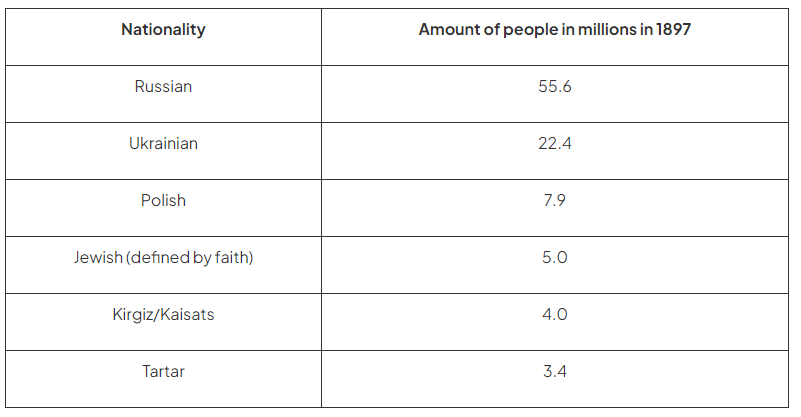
Social Difficulties
- Russia's social structure was notably complex and posed significant challenges.
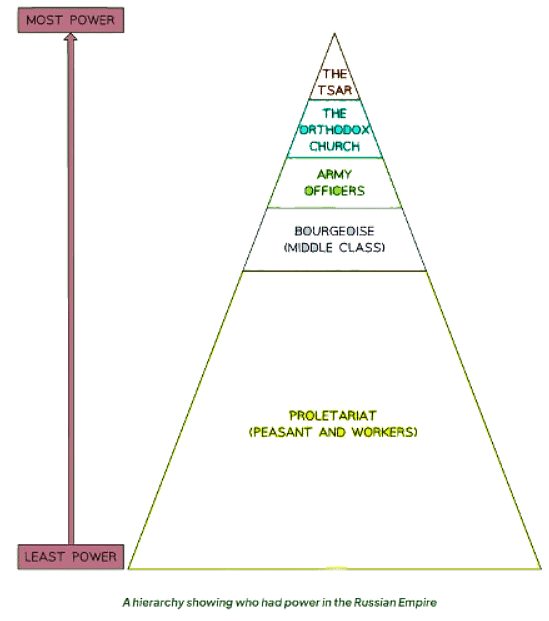
How Did Each Social Group Challenge the Stability of the Empire?

Economic Challenges in Russia
- Russia saw some economic development.
- Finance Minister Sergei Witte spurred the 'Great Spurt' in the 1890s.
- Russia began constructing the Trans-Siberian Railway.
- Production in heavy industry rose.
- The rouble became a gold-standard currency, boosting foreign trade.
- Witte attracted foreign investment into Russian industry.
- Witte improved infrastructure by building roads and telegraph lines.
- Industrialisation had some positive impact on the economy.
- Finance Minister Sergei Witte spurred the 'Great Spurt' in the 1890s.
- Despite progress, Russia's economy remained backward.
- The economy still heavily depended on agriculture.
- Peasant farmers used unproductive medieval farming techniques.
- Only certain regions, like European Russia, were suitable for farming.
- These regions could face famine, impacting the economy and food supply.
- Russian industry focused on quantity rather than quality.
- Despite investments, Russia's industry was outdated and needed modernisation.
- The economy still heavily depended on agriculture.
What Did Russia Produce?
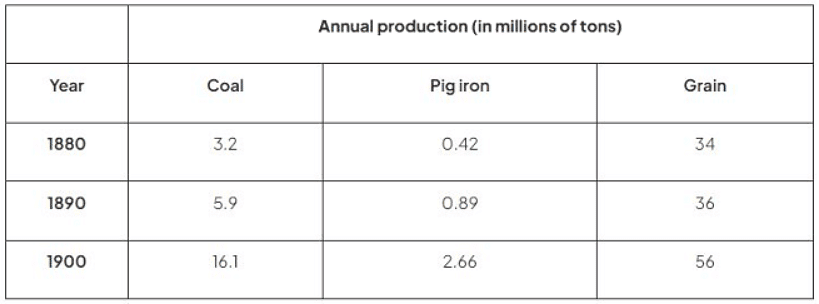
- The table illustrates Russia's reliance on agriculture.
Political Challenges
- The Fundamental Laws of the Empire outlined that:
- The Emperor of all the Russias held absolute power as an autocratic monarch.
- Conceptually, the tsar presided over a hierarchically organized government.
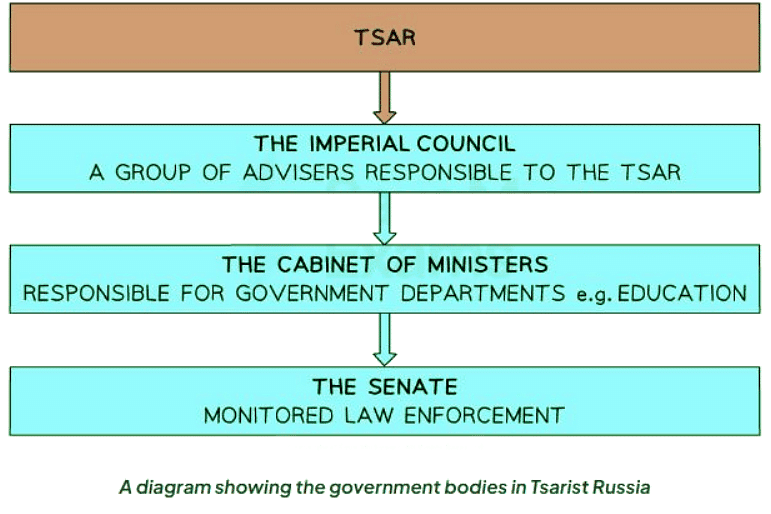
- The government had numerous weaknesses.
- No government bodies possessed real power.
- The tsar appointed individuals to serve in these bodies.
- Their role was limited to advising or handling administrative tasks.
- There was no elected parliament or duma.
- The tsar did not think his people should have the right to vote.
- The upper classes viewed most Russians as uneducated and uncivilised.
- Tsarina Alexandra believed the Russian people should be "under the whip."
- No government bodies possessed real power.
- Political parties existed but were not acknowledged by the tsar.
Political Groups prior to 1905
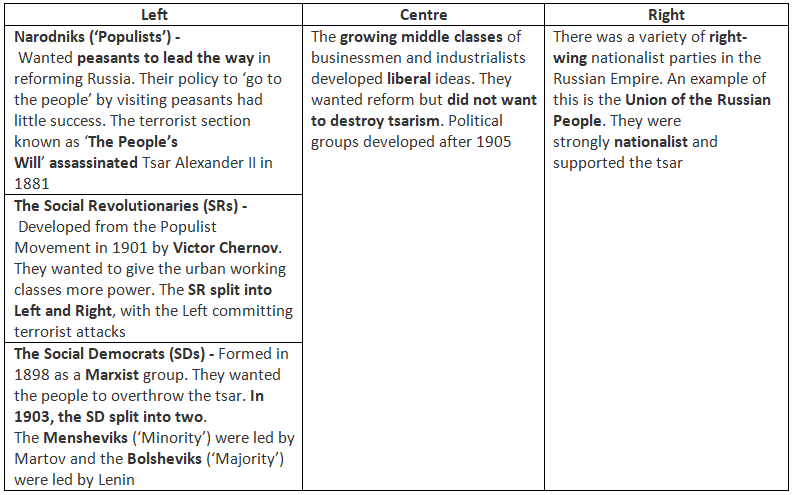
- Several rural communities had zemstvos, which were local councils where representatives were elected by the populace. However, this system wasn't truly democratic as a noble's vote held more weight than a peasant's.
- The zemstvos were responsible for various aspects including education, healthcare, social welfare, food distribution, road maintenance, and government functions. Initially, officials supported the zemstvo concept as they believed it could help manage rural populations and facilitate tax collection.
- As of 1905, zemstvos began advocating for constitutional changes. Many zemstvo members, predominantly from the middle and upper classes, sought suffrage rights.
Question for The Difficulties of Ruling Russia up to 1914Try yourself: What was one of the major challenges faced by Tsar Nicholas II in governing the Russian Empire?View Solution
Rise in Extremism
What is Marxism?
- Karl Marx, a German philosopher, collaborated with Friedrich Engels to formulate the theory of Communism outlined in two pivotal works:
- "The Communist Manifesto" (1848) - focusing on the political and social aspects of Communism
- "Das Kapital" (1867) - delving into the economic facets of Communism
- Marxism posited that all nations progress through a sequence of five distinct historical stages.
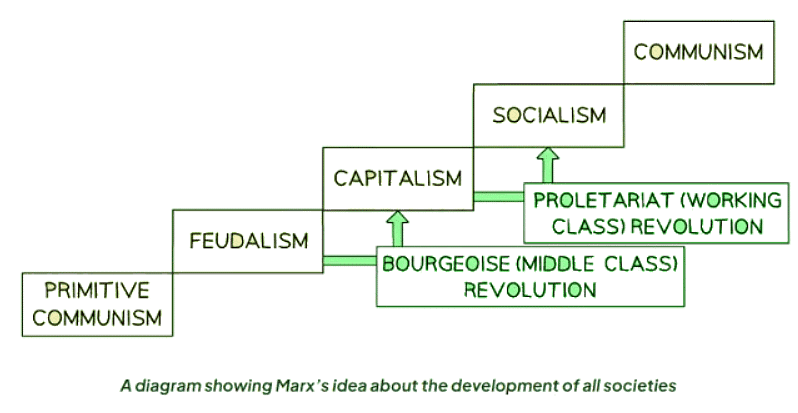
Growth of Marxism in the Russian Empire
- Plekhanov translated Marx's works into Russian in 1883.
- During the 1890s, the rise of industrialization fostered the emergence of various elements:
- Formation of workers' organizations.
- Emergence of illicit trade unions.
- Establishment of Marxist discussion groups such as the Tchaikovsky Circle.
- These entities contributed to the wider dissemination of Marxist ideologies across the Russian Empire.
- In Russia, the prominent Marxist political factions were:
- The Mensheviks.
- The Bolsheviks.
How did the Mensheviks and the Bolsheviks differ in their interpretation of Marxism?

How did the Tsar combat extremism?
- The government imposed strict censorship measures, including the restriction of artistic expressions like works by Marx.
- The Okhrana, the secret police of Tsarist Russia, was instrumental in maintaining order by:
- Investigating Communists, socialists, and trade unionists.
- Surveillance of government officials.
- Arresting and interrogating suspects.
- Exiling political dissidents to Siberia.
The document The Difficulties of Ruling Russia up to 1914 | History for GCSE/IGCSE - Class 10 is a part of the Class 10 Course History for GCSE/IGCSE.
All you need of Class 10 at this link: Class 10
|
81 videos|87 docs|18 tests
|
FAQs on The Difficulties of Ruling Russia up to 1914 - History for GCSE/IGCSE - Class 10
| 1. What were the geographical challenges faced by the rulers of Russia up to 1914? |  |
Ans. The rulers of Russia up to 1914 faced geographical challenges such as the vast size of the Russian Empire, extreme weather conditions, and difficulties in communication and transportation due to the lack of infrastructure.
| 2. How did the Pale of Settlement impact the ruling of Russia up to 1914? |  |
Ans. The Pale of Settlement was a restricted area where Jews were allowed to live in the Russian Empire. This led to social tensions and discrimination, making it a challenge for the rulers to maintain control and harmony within the empire.
| 3. What were the economic challenges faced by the rulers of Russia up to 1914? |  |
Ans. The rulers of Russia up to 1914 faced economic challenges such as a predominantly agricultural economy, limited industrialization, and a large population that was often impoverished. These factors made it difficult to modernize and develop the economy.
| 4. How did social difficulties impact the ruling of Russia up to 1914? |  |
Ans. Social difficulties in Russia up to 1914 included a rigid social hierarchy, widespread poverty, and discontent among the lower classes. These factors contributed to social unrest and made it challenging for the rulers to maintain stability and control.
| 5. What was Nicholas II like as a Tsar and how did his leadership style influence the ruling of Russia up to 1914? |  |
Ans. Nicholas II was known for his autocratic rule, reluctance to implement reforms, and poor decision-making, which ultimately contributed to the decline of the Russian Empire. His leadership style led to widespread dissatisfaction among the population and made it difficult for the rulers to effectively govern Russia up to 1914.
Related Searches




















